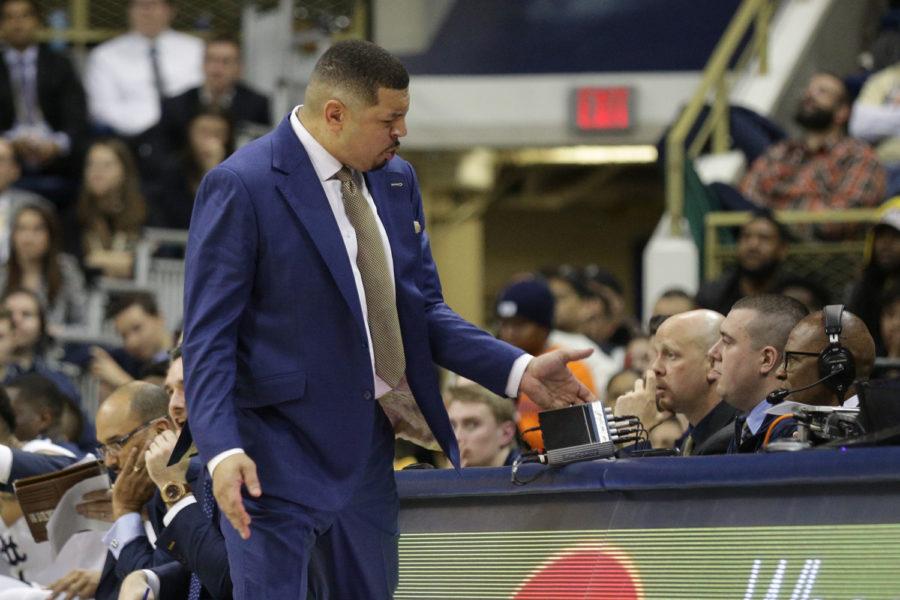Capel tries to keep program human amidst pandemic basketball
Thomas Yang | Assistant Visual Editor
Coach Capel questions a foul.
December 7, 2020
While listening to the question, Pitt men’s basketball head coach Jeff Capel’s head slid into his hands, hiding his face from the view of a Zoom window he was projected into. He came back up with a heavy sigh.
“You know, it’s a really interesting question,” Capel said.
The question: “Is it difficult for players and coaches to be so focused on basketball right now, at a time when most people — college students in particular — are at home relaxing and celebrating the holidays?”
The answer: yes.
With Christmas Day and its accompanying mandatory three days off for student athletes sandwiched between two games this year, Capel said he is struggling to figure out how to distribute days on and off the court.
“To be quite frank with you, it’s something that I’m struggling with as a coach — what’s the best thing to do for our team, for my guys,” Capel said. “I’m not even thinking about the program right now.”
Some programs and head coaches may allow players to return home for their three days off, but given the risks that travel during the worsening COVID-19 pandemic pose, Capel said he knows coaches that won’t allow athletes to leave for Christmas. And because most venues aren’t allowing fans into the stands, there is a high possibility that some athletes won’t see their families at all this holiday season.
“There are a lot of programs that aren’t allowing their guys to go home for Christmas,” Capel said. “And I’m struggling with that. Of all the years that a kid should be with his family [at the holidays], 2020 is at the very very top of that.”
Even the “team-building activities” — as Capel called them — that are allowed during the mandatory three days off have limited potential when you’re trying to work around a deadly disease that closes movie theaters, restaurants and limits large gatherings.
Pitt’s first three games were played unencumbered by any cancellations or postponements, but that doesn’t mean the pandemic hasn’t taken a toll on the program.
“I feel for these young people,” Capel said. “I see what it’s doing to my 13-, 11- and eight-year old. I see what it’s doing everyday at home. I see what distance learning is doing. I see what not being able to see their friends is doing. I see what being cooped up in a house all day [is doing]. And [my players] are going through the same thing, except they’re away from their families.”
Still, a return to work hasn’t made things much easier. Capel said it feels odd to be back in the gym playing basketball.
When college basketball’s postseason was abruptly called on March 12, the United States recorded 51 new deaths due to COVID-19. As Pitt prepared to fly this past Sunday for a road game at Northwestern in Evanston, Illinois, more than 1,100 people died that day of the coronavirus.
The college basketball season shut down in March and ever since, players and coaches have been itching for a reason to break the monotony of homebody life that has become commonplace around the world.
But with most teams less than six games into their 2020 seasons, surging COVID-19 numbers are already threatening the feasibility of the sport through the winter.
“These kids are away [from their families] and they’re out laying it all on the line to entertain people,” Capel said. “Something just doesn’t feel right about it now … I don’t know why you cancel it in March, but you say it’s OK to do it right now. But what do I know?”
Capel bemoaned the lack of leadership in college basketball that leads to the various inconsistencies and uncertainties between different programs. Modest in his assessment of his own knowledge about COVID-19, Capel did have one suggestion that could help players and coaches alike get a break and stay safe from the virus.
“I don’t know who the leadership is, I have no idea, but you’d think they’d consider a bit of a pause, I would think,” Capel said. “Just so kids can be with their families, coaches can be with their families. But most importantly, what’s going on in our country right now is staggering.”
A break, preferably longer than the current three days allowed, would let players go home and recuperate from a long semester as well as ensure that the kind of testing and tracing regimen that would be necessary to keep the virus contained is carried out.
But no such break is on the books currently. The college basketball season marches on, dragging a hesitant Capel along with it. And while the NCAA’s leadership appears to many to be reluctant to fully meet the challenges COVID-19 presents, player empowerment movements from this summer in the Pac 12 and Big 10 conferences indicate that calls for change are coming from college athletics’ highest level.
Even if a radical altering of the college basketball model wasn’t destined for this season, Capel is pushing for a more compassionate set of rules and increased support for the players, who he said are expected to hold a deeper obligation to their sport than the NCAA would have the public believe.
While the NCAA designates players as amatuer student-athletes, Capel doesn’t think that designation fits.
“I don’t think anyone can say anymore that these young men are amateurs,” Capel said. “That’s out the window. They’re not. They absolutely aren’t.”



